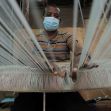The Trump administration is putting more pressure on China by banning cotton imports from the country's Western region, Xinjiang. The move comes after suspicions that the region is using slave labor to make textile goods.
The U.S. Customs and Border Protection agency shared last Wednesday that the ban would be on cotton and cotton products from one of China’s largest producers, Xinjiang Production and Construction Corps (XPCC). China is one of the globe's largest cotton producers, with 30% of its cotton coming from XPCC.
Kenneth Cuccinelli, Secretary of the Department of Homeland Security, warned that the “made in china” label should serve as a warning label for consumers. In a news conference, Cuccinelli went on to add, “The cheap cotton goods you may be buying for family and friends during this season of giving - if coming from China - may have been made by slave labor in some of the most egregious human rights violations existing today in the modern world.”
The move comes after global pressure against China because of their treatment of the region’s Uighur Muslim minority.
Uighurs Labor Camps
In 2016, suspected destruction of Uighur mosques in the western region became widespread after satellite imaging showed empty plots of land where the mosques once stood. Chinese officials denied any destruction of the mosques even as more video and photographic evidence surfaced.
By 2017, over one million Uighurs were reported to be held against their will in what appeared to be camps or detention centers. In response to global concern about the persecution of the Uighur Muslims, Beijing branded the camps as re-education centers. The Chinese government contends that the re-education centers are a way to combat terrorism by re-educating Uighur Muslims and teaching them about China's customs and culture instead. Citing attacks from 2013 and 2015, the Chinese government contends the centers are meant to scrub away the extremist views of Uighur Muslims that pose a potential security threat to China.
In July of 2019, 22 countries (mainly European, and not including the U.S.) wrote a letter to the U.N. Human Rights Council in which they expressed their concern about the inhumane detention. The letter called on China to “uphold its national laws and international obligations and to respect human rights and fundamental freedoms, including freedom of religion or belief.”
In response to the letter, supporters of the Chinese Government shared their own letter with the Human Rights Council in defense of the Government. That letter was brief and praised China for taking the initiative to fight terrorism and suppress religious extremism. The letter was surprisingly backed by a majority of Muslim signatories, including Egypt, Saudia Arabia, and Qatar.
According to the United Nations, credible reports show that the over one million Uighur Muslims who are being detained against their will are being forced into slave labor camps. It is in these labor camps that workers are making textile goods that then enter the supply chain, being sold all across the globe. China contends that these labor camps are instead vocational training centers meant to give the workers essential skills so that they can be successful.
China’s Response
In response to the allegations of forced labor being used to make textile goods, Hua Chunying, a spokesperson for China’s Foreign Ministry, denied the claims made by the U.S. Government. Chunying shared the following statement in a news conference: “All workers in Xinjiang choose their occupations based on their own volition and sign labor contracts with firms based on the principle of equality and free will.”
Impact on American Goods
Because the sanctions target XPCC, many apparel firms and other textile companies will need to remove any interaction of XPCC-produced goods from their supply chains. This will come as a huge blow for some businesses, especially considering how much of a major player XPCC is in the textile industry.
Major retailers, including Patagonia Inc, Zara, and Gap Inc, do not source their cotton and other textiles from factories based in Xinjiang. Still, because some Uighur labor workers have been scattered through the region, these major retailers can't completely rule out that their supply chains are void of goods made from slave labor.
In a joint statement put out by the American Apparel and Footwear Association, the National Retail Industry Leaders Association, and the United States Fashion Industry Association, the groups express their support of the Trump administration's ban on cotton from XPCC. Their joint statement says in part, “We welcome increased efforts by the U.S. Government and other entities to address the human rights abuses, including forced labor and the persecution and detention of Uyghurs and other ethnic minorities in China.”






